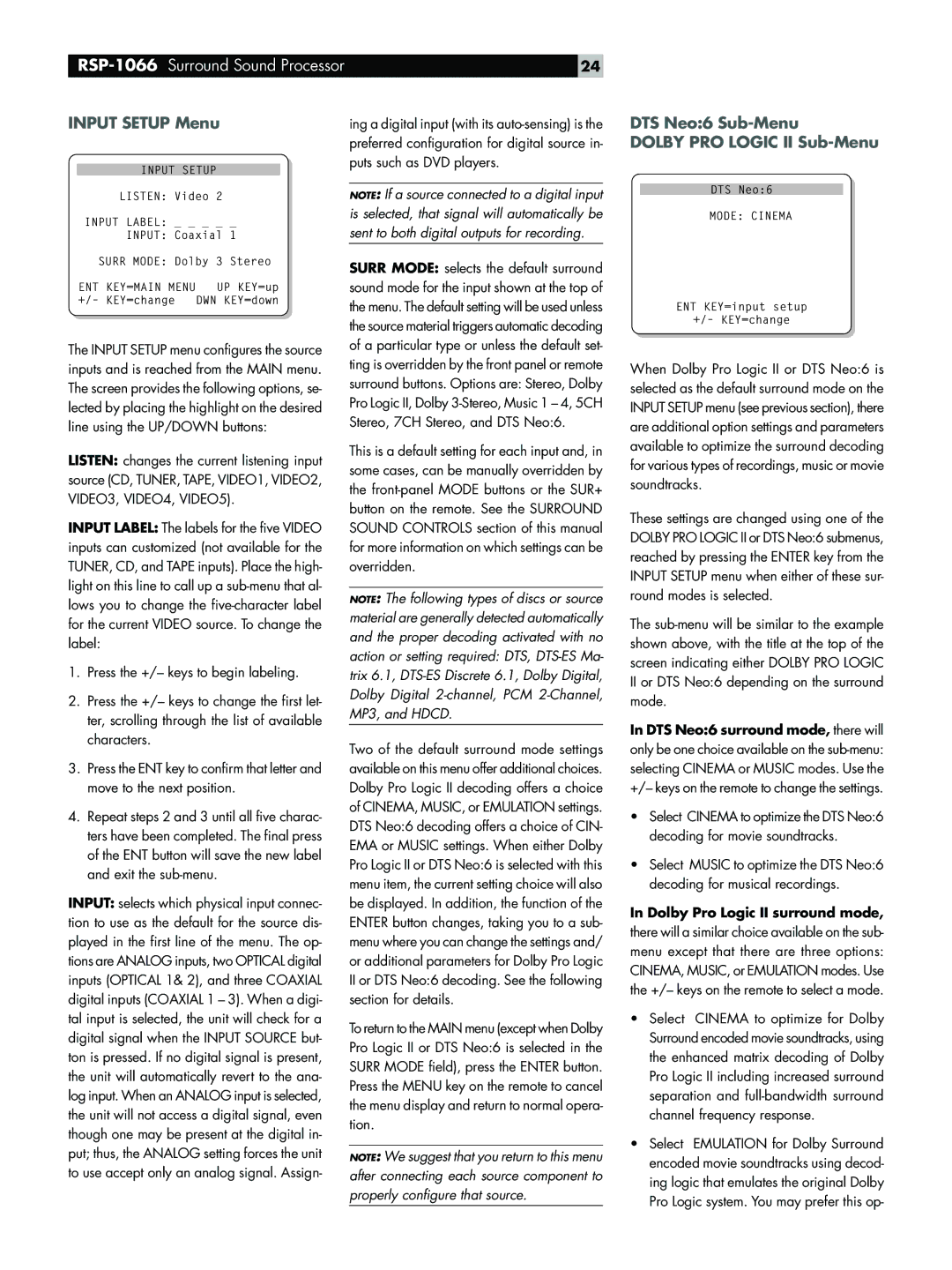
24 |
INPUT SETUP Menu
INPUT SETUP
LISTEN: Video 2
INPUT LABEL: _ _ _ _ _
INPUT: Coaxial 1
SURR MODE: Dolby 3 Stereo
ENT | KEY=MAIN MENU | UP KEY=up |
+/– | KEY=change | DWN KEY=down |
The INPUT SETUP menu configures the source inputs and is reached from the MAIN menu. The screen provides the following options, se- lected by placing the highlight on the desired line using the UP/DOWN buttons:
LISTEN: changes the current listening input source (CD, TUNER, TAPE, VIDEO1, VIDEO2, VIDEO3, VIDEO4, VIDEO5).
INPUT LABEL: The labels for the five VIDEO inputs can customized (not available for the TUNER, CD, and TAPE inputs). Place the high- light on this line to call up a
1.Press the +/– keys to begin labeling.
2.Press the +/– keys to change the first let- ter, scrolling through the list of available characters.
3.Press the ENT key to confirm that letter and move to the next position.
4.Repeat steps 2 and 3 until all five charac- ters have been completed. The final press of the ENT button will save the new label and exit the
INPUT: selects which physical input connec- tion to use as the default for the source dis- played in the first line of the menu. The op- tions are ANALOG inputs, two OPTICAL digital inputs (OPTICAL 1& 2), and three COAXIAL digital inputs (COAXIAL 1 – 3). When a digi- tal input is selected, the unit will check for a digital signal when the INPUT SOURCE but- ton is pressed. If no digital signal is present, the unit will automatically revert to the ana- log input. When an ANALOG input is selected, the unit will not access a digital signal, even though one may be present at the digital in- put; thus, the ANALOG setting forces the unit to use accept only an analog signal. Assign-
ing a digital input (with its
NOTE: If a source connected to a digital input is selected, that signal will automatically be sent to both digital outputs for recording.
SURR MODE: selects the default surround sound mode for the input shown at the top of the menu. The default setting will be used unless the source material triggers automatic decoding of a particular type or unless the default set- ting is overridden by the front panel or remote surround buttons. Options are: Stereo, Dolby Pro Logic II, Dolby
This is a default setting for each input and, in some cases, can be manually overridden by the
NOTE: The following types of discs or source material are generally detected automatically and the proper decoding activated with no action or setting required: DTS,
Two of the default surround mode settings available on this menu offer additional choices. Dolby Pro Logic II decoding offers a choice of CINEMA, MUSIC, or EMULATION settings. DTS Neo:6 decoding offers a choice of CIN- EMA or MUSIC settings. When either Dolby Pro Logic II or DTS Neo:6 is selected with this menu item, the current setting choice will also be displayed. In addition, the function of the ENTER button changes, taking you to a sub- menu where you can change the settings and/ or additional parameters for Dolby Pro Logic
IIor DTS Neo:6 decoding. See the following section for details.
To return to the MAIN menu (except when Dolby Pro Logic II or DTS Neo:6 is selected in the SURR MODE field), press the ENTER button. Press the MENU key on the remote to cancel the menu display and return to normal opera- tion.
NOTE: We suggest that you return to this menu after connecting each source component to properly configure that source.
DTS Neo:6 Sub-Menu
DOLBY PRO LOGIC II Sub-Menu
DTS Neo:6
MODE: CINEMA
ENT KEY=input setup
+/– KEY=change
When Dolby Pro Logic II or DTS Neo:6 is selected as the default surround mode on the INPUT SETUP menu (see previous section), there are additional option settings and parameters available to optimize the surround decoding for various types of recordings, music or movie soundtracks.
These settings are changed using one of the DOLBY PRO LOGIC II or DTS Neo:6 submenus, reached by pressing the ENTER key from the INPUT SETUP menu when either of these sur- round modes is selected.
The
IIor DTS Neo:6 depending on the surround mode.
In DTS Neo:6 surround mode, there will only be one choice available on the
•Select CINEMA to optimize the DTS Neo:6 decoding for movie soundtracks.
•Select MUSIC to optimize the DTS Neo:6 decoding for musical recordings.
In Dolby Pro Logic II surround mode,
there will a similar choice available on the sub- menu except that there are three options: CINEMA, MUSIC, or EMULATION modes. Use the +/– keys on the remote to select a mode.
•Select CINEMA to optimize for Dolby Surround encoded movie soundtracks, using the enhanced matrix decoding of Dolby Pro Logic II including increased surround separation and
•Select EMULATION for Dolby Surround encoded movie soundtracks using decod- ing logic that emulates the original Dolby Pro Logic system. You may prefer this op-
